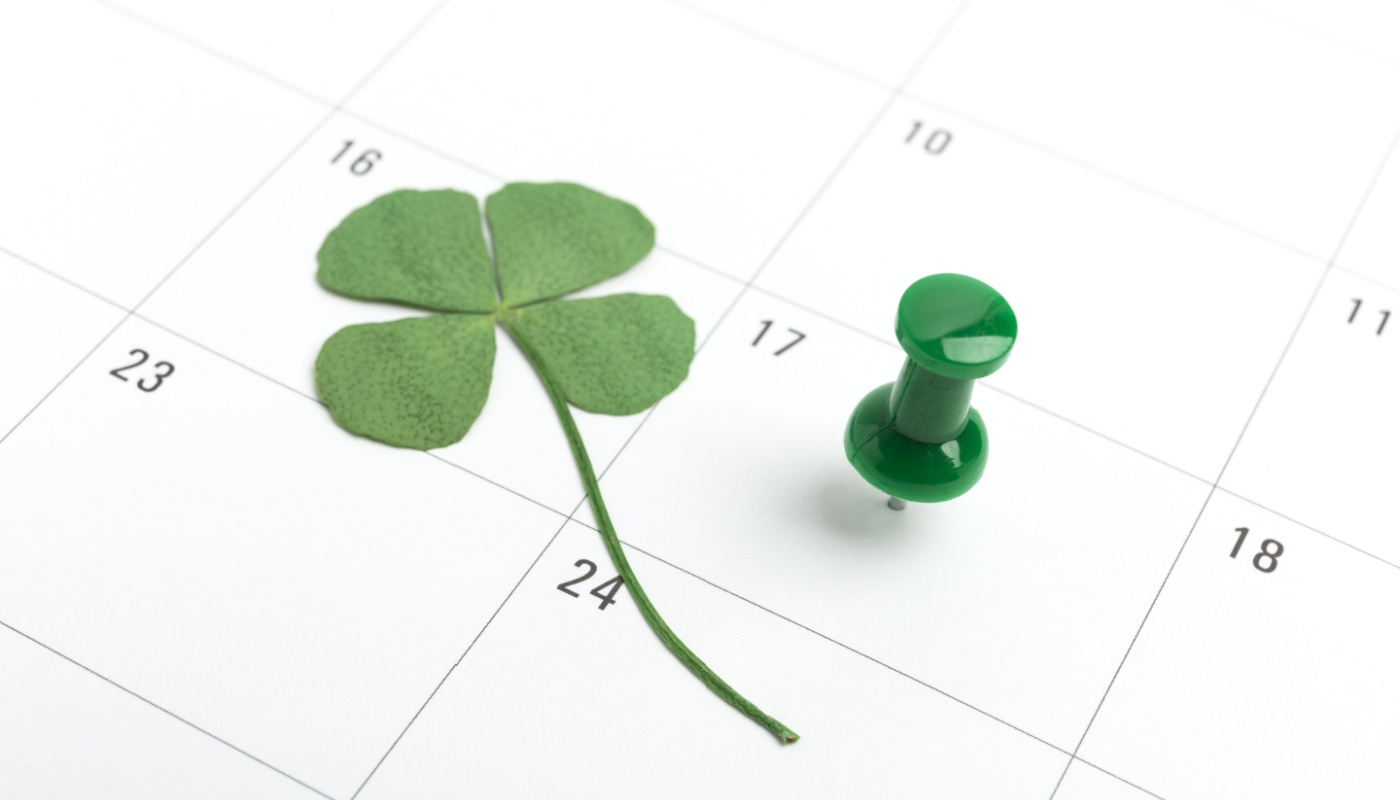
News writer
Every week, millions of hopefuls buy lottery tickets, dreaming of a jackpot that could change their lives forever. But is there a specific day of the week that is statistically luckier for lottery players, or is winning purely a matter of chance?
Some swear by superstitions, while others trust in mathematical probability. Let's explore the science, the history, and the psychology behind this intriguing question.
The superstition behind lucky days
People are naturally drawn to patterns and meaning, even if there is some kind of randomness at play. For many lottery players, they believe in “lucky” days. These days are often based on personal experiences or cultural traditions.
For some players, they may buy lottery tickets on special occasions, like birthdays or anniversaries, and those are their “lucky” days. Others may buy them on a specific day of the week, like Tuesdays or Fridays, because that is when they have won in the past.
Meanwhile, astrologers have their own thoughts on certain days being more lucky for gamblers. Psychic astrologer Inbaal Honigman states that Thursday, which is associated with Jupiter, the planet of luck, is the best day to play the lottery.
Along those same lines, Sunday, which is ruled by the sun and represents success, is often considered to be lucky. On the opposite side of things, Fridays and Saturdays are thought to be not as lucky because they are associated with stability and karma.
At the same time, many lottery players have cultural beliefs that play a role in them thinking a day can be lucky or unlucky. Friday the 13th is often considered to be unlucky in Western culture, but it has proven to be lucky for some lottery players.
In Michigan, they have seen four jackpot winners on Friday the 13th for the Mega Millions draw game. This can show that superstition and luck often go hand in hand.
How does the lottery schedule work into things?
While we might consider certain days to be luckier than others, it can also be the fact that certain days have more lottery drawings than others. The multi-state games often produce bigger jackpots and will get more players buying those tickets, which are held:
- Powerball: Mondays, Wednesdays, and Saturdays
- Mega Millions: Tuesdays and Fridays
- Lucky for Life/Cash4Life: Daily
Because these drawings happen on certain days, the big jackpot winners are inevitably going to come from these days. If a player thinks Tuesdays happen to be lucky, it might just be that they are noticing Mega Millions draws happen on Tuesdays. In reality, it's not the day that's lucky, but it's just when the drawing takes place.
What are the lucky days?
If there is a “lucky” day, then past data should show it. The Action Network conducted a study which analyzed past lottery results to determine if any days of the week stood out as lucky. These results seemed to show randomness and not a specific trend.
Some of the trends or patterns they found:
- Many state lotteries have more winners on the weekends. This can be linked to more ticket purchases being made since people have more free time on Fridays and Saturdays.
- Holidays and special occasions, like New Year's Eve, have higher participation. That means the more tickets that are sold, the more likely that a winning ticket will have been sold for the winning numbers drawn.
Again, those things are based on increased sales and not just on inherent luck. For the Action Network, this is a breakdown of their lucky days and the number of Powerball or Mega Millions jackpots won on those days:
- Wednesdays: There were 126 Powerball wins on this day
- Fridays: 119 Mega Millions wins
- Saturdays: 116 Powerball wins
- Tuesdays: 100 Mega Millions wins
- Mondays: Nine Powerball wins
Of course, this is just considering the multi-state games and not in-state draw games also. That could shift the lucky days, but a lot of those draw games are drawn on Wednesdays and Saturdays also.
Probability and math
For lottery games, they are designed to be random. They use machines or computerized systems to ensure each draw is independent. What does that mean? The numbers drawn on Saturday for Powerball have no effect on the numbers drawn on Monday.
When looking at it, the Powerball odds are 1 in 292.2 million, regardless of whether you play on Saturday or Monday. For Mega Millions players, they have odds of 1 in 290,472,336 (recently changed with the latest game changes) no matter what day they buy a ticket. Based on that, any pattern of “lucky” days would be statistically insignificant.
Meanwhile, mathematicians will argue that luck, as lottery players see it, is actually just probability manifesting in unpredictable ways. Because each draw is independent, past results don't influence any future outcomes.
Despite that, lottery players will often believe that since a certain day hasn't seen a big win recently, then it's “due” for a jackpot soon. When in reality, each drawing is separate from all the other drawings.
Psychological factors and confirmation bias
People just love finding patterns where none exist. This is known as apophenia, which explains why people see lucky numbers or patterns in random lottery results. If they happen to win big on a Wednesday, then they attribute that success to the day rather than chance.
From there, confirmation bias further reinforces this belief. If a certain player goes out and buys a Powerball ticket every Wednesday and then wins one time, they will remember that one win more than all the other losses, which will reinforce the idea that Wednesdays are lucky.
Many lottery players may also have personal rituals they follow and deem as lucky. Some will only buy tickets from a specific store, or they make sure to play the same numbers every week. While these habits can make it more fun for the players, they don't affect the randomness of the draw.
Statistical analysis suggests that lottery outcomes are purely random, but psychology tells us a different story about why people think that certain days are luckier than others. A cognitive bias that plays a role in this is called the availability heuristic, which is the tendency to remember significant events more easily than boring ones.
This can be seen when a big jackpot was won on Friday the 13th. That win sticks out in your memory and reinforces the belief that Friday the 13th is actually lucky and not unlucky, like everyone else believes. However, when people lose on that same date, they just tend to dismiss it as just another unlucky draw.
As mentioned above, confirmation bias is another key bias. This is where people actively seek out and remember information that supports their existing beliefs. If you always buy lottery tickets on your birthday and you finally win, then you will credit that date as lucky, even though you hadn't won on your ten previous birthdays.
In addition, cultural beliefs and traditions can influence our perception of luck. For many Asian cultures, the number 8 is considered lucky. Because of that, some players might favor lottery draws that fall on dates containing that number.
There are also superstitions and rituals that can reinforce the idea of lucky days. Some people will play certain numbers or buy from certain stores. While this makes the player feel like they have some kind of control over a very unpredictable game, it ultimately has no impact on the odds.
The psychological aspect of lottery plays shows us that while luck is random in a mathematical sense, our perception of it is deeply shaped by human biases and beliefs. Therefore, the idea of a lucky day is less about statistical probability and more about how our minds interpret patterns, coincidences, and rare wins.
Why do people keep looking for a lucky day, then?
Regardless of all that was mentioned above, people are still looking out for that lucky day. Why? Because it gives them a sense of control over an uncontrollable event.
No one can predict what will happen with the lottery and the odds are stacked against players. By believing in these lucky days, it gives some players hope and makes the experience more enjoyable.
There can also be a marketing element involved. Lotteries will benefit from players thinking certain days are luckier. Based on that, many state lotteries will run promotions on these lucky days to help increase sales. These promotions can encourage more people to buy tickets on those days, which reinforces the perception that these days are luckier.
The influence of player habits on “lucky” days
One factor that is often overlooked when it comes to this lucky day debate is how players' habits influence when they buy their lottery tickets. For a lot of players, they might go out and purchase them on payday, which often falls on a Friday or maybe the 1st and 15th of the month.
Based on that, they might consider Fridays as a lucky day or the 1st or 15th as a lucky number and a date on which they should always buy tickets.
Other players might have more free time on the weekends, so that is when they will stop in and buy tickets. These purchasing trends can skew the perception of lucky days since more winners will naturally emerge from days with higher sales.
Final verdict: Is it just a numbers game?
Despite all the myths and superstitions surrounding these lucky days, the reality is simple: lottery results are random. There is no evidence that one day is luckier than another.
However, if playing on a certain day makes the lottery more enjoyable or meaningful for you, then go for it. Playing the lottery is supposed to be fun and give players the hope of hitting that big jackpot, so if a lucky day adds to their excitement, just let it be.
For those wanting the best shot at winning, the best strategy isn't picking a lucky day but rather playing consistently, managing your expectations, and remembering that the lottery is a game of chance. Always play within your means, regardless of whether you are buying your ticket on a Monday, Tuesday, or Saturday. And who knows? Your lucky day might just be the day you least expect.


















Comments